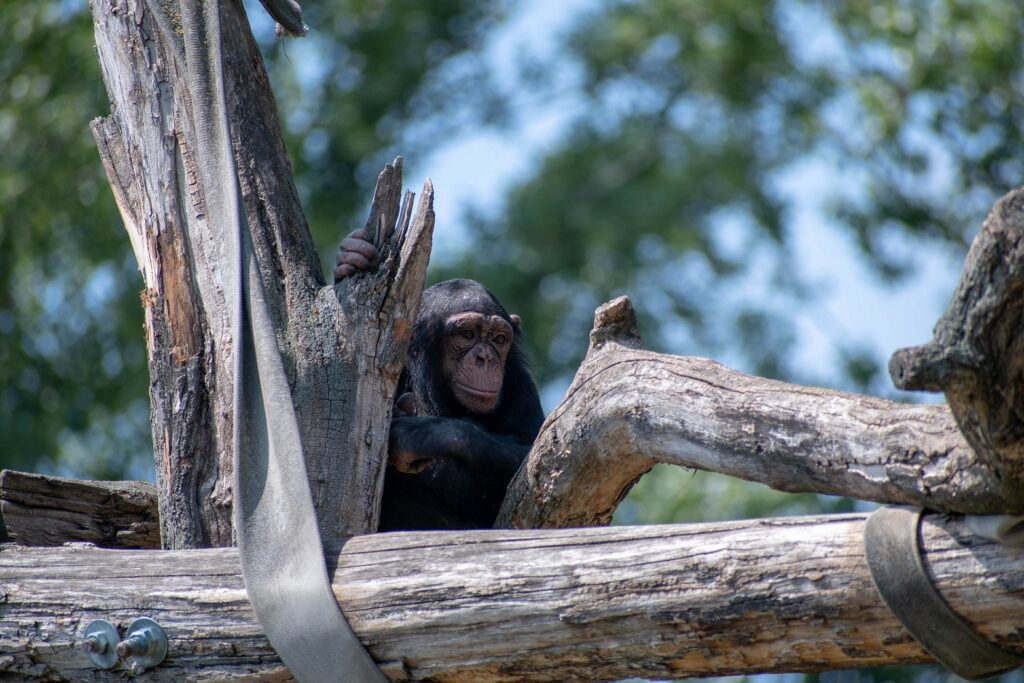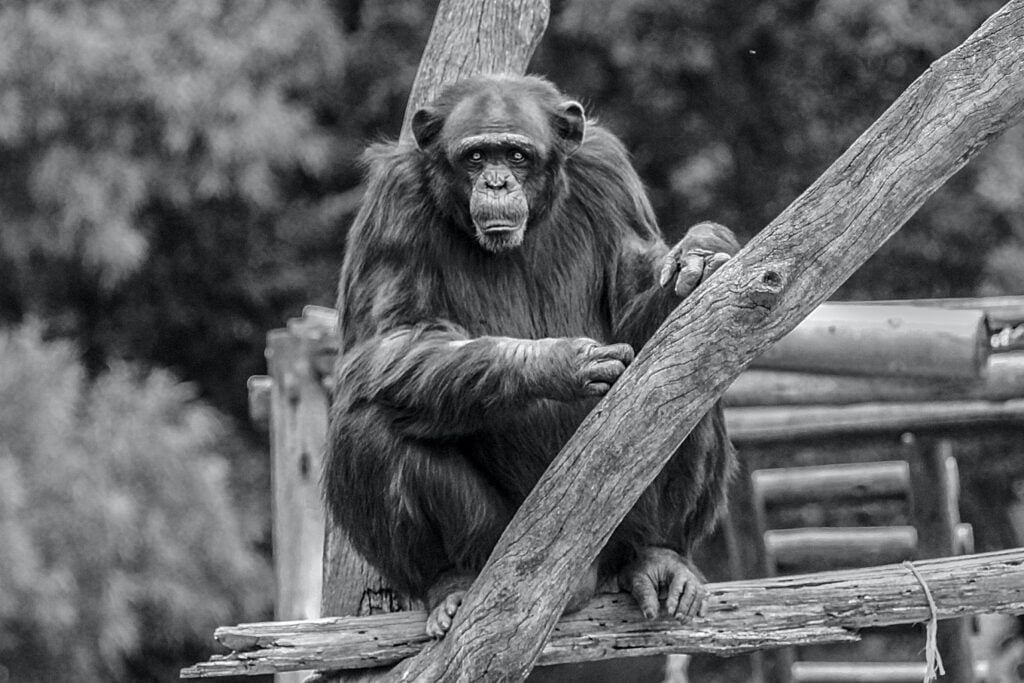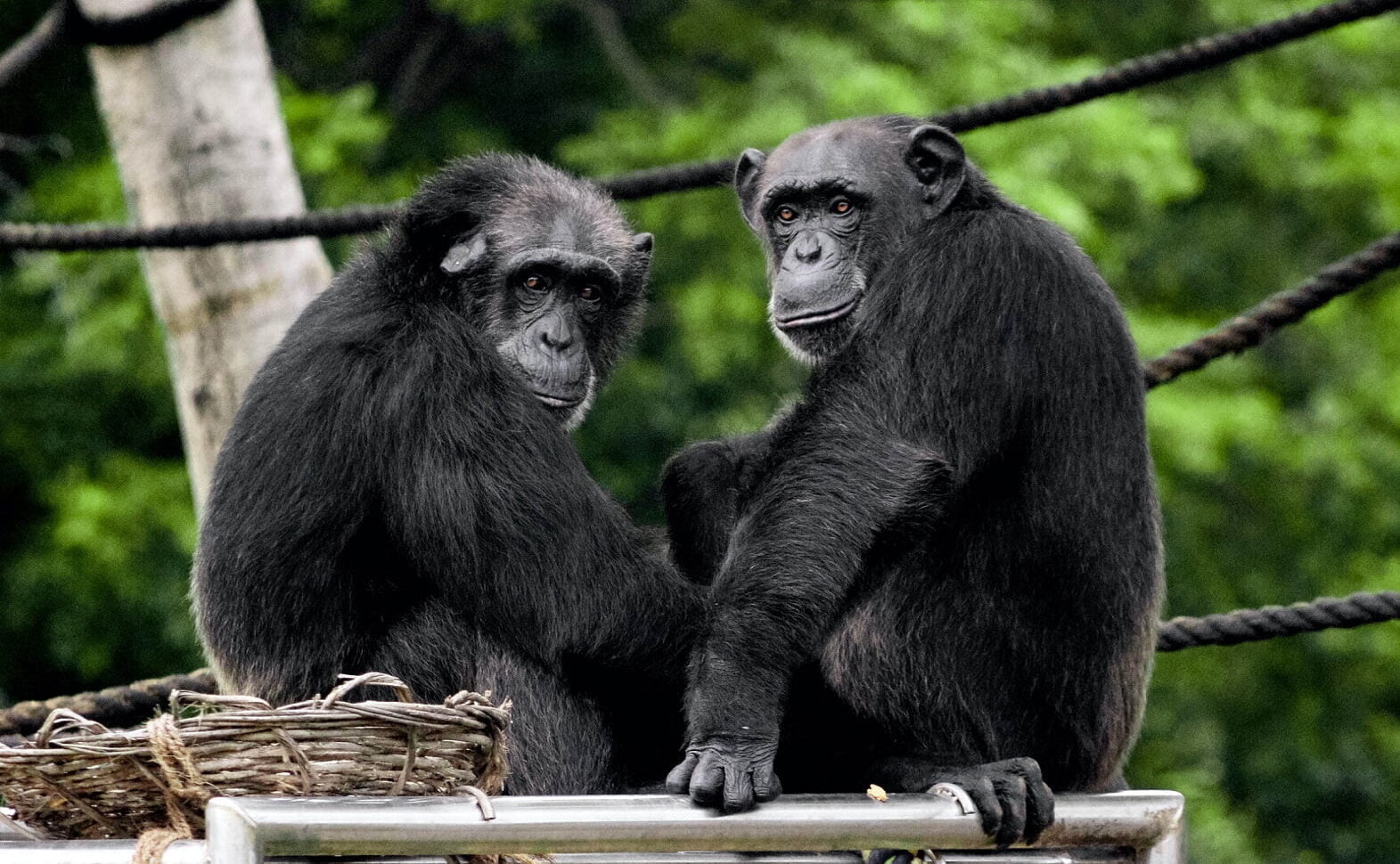The wonders of the natural world never cease to amaze scientists and nature enthusiasts, as they are constantly captivated by the enthralling interactions and behaviors found within it.
One intriguing phenomenon is the fact that chimpanzees, our closest living relatives in the animal kingdom, have been observed hunting and consuming monkeys.
This article delves into the reasons behind why chimpanzees eat monkeys and provides insights into the fascinating facts surrounding this behavior.
What are Chimpanzees?

Chimpanzees, also known as chimps, are highly intelligent and social primates that share approximately 98% of their DNA with humans. They belong to the genus Pan and are native to the forests and woodlands of central and western Africa.
Chimpanzees are renowned for their complex behaviors, tool usage, and remarkable cognitive abilities, making them one of the most fascinating species on our planet.
They exhibit a diverse range of social interactions and have the ability to communicate through a variety of vocalizations, gestures, and facial expressions.
Chimpanzees are our closest living relatives, providing valuable insights into our own evolutionary history and offering a glimpse into the rich world of animal behavior.
Chimpanzees Hunting Behavior
Chimpanzees, scientifically known as Pan troglodytes, are highly intelligent and social primates found in the dense forests of Central and West Africa.
Although they are primarily herbivorous, consuming fruits, leaves, and seeds, chimpanzees also exhibit opportunistic hunting behavior.
Studies have revealed that different chimpanzee communities have distinct hunting strategies, but the consumption of monkeys has been observed in various populations.
Why Do Chimpanzees Eat Monkeys?

- Nutritional Benefits – One of the main reasons chimpanzees hunt and consume monkeys is for the nutritional benefits. Monkeys are a rich source of protein and essential fatty acids, which may be scarce in the chimpanzee’s predominantly plant-based diet. Consuming monkeys provides an important supplement to their nutritional needs, particularly during periods of food scarcity.
- Energy Efficiency – Compared to other potential prey species, monkeys are relatively easy for chimpanzees to catch and kill due to their arboreal nature. The agility and tree-dwelling habits of monkeys make them a more accessible food source compared to larger animals that are harder to capture. The energetic investment required for hunting monkeys is often outweighed by the energy gained from a successful kill.
- Social Dynamics – Interestingly, chimpanzee hunting can also have social implications. Hunting and sharing meat can strengthen social bonds within a chimpanzee community. The act of hunting together promotes cooperation and collaboration among individuals, fostering a sense of unity within the group.
- Energy Boost – Meat is a concentrated source of calories, and consuming monkeys can provide a quick energy boost for chimpanzees. This can be particularly important during periods of high activity or when they need to recover from a strenuous task.
Chimpanzee Hunting Techniques
Chimpanzees employ several hunting techniques when targeting monkeys. These techniques often involve stealth, coordination, and strategic planning.
- Ambush Hunting – Chimpanzees may quietly position themselves along known monkey travel routes, waiting patiently for an unsuspecting monkey to pass by. Once within striking distance, the chimpanzee will launch a sudden attack, using their strength and agility to overpower their prey.
- Cooperative Hunting – In some cases, chimpanzees will collaborate during hunts. They may spread out and surround a group of monkeys, strategically cutting off their escape routes. This coordinated effort increases the chances of a successful hunt.
- Tool Use – Chimpanzees have demonstrated remarkable tool-use skills during hunting. They have been observed fashioning and using spears from branches to stab and impale monkeys in tree hollows, where they take refuge. This behavior showcases their ingenuity and adaptability.
- Opportunistic Hunting – In some cases, chimpanzees opportunistically exploit situations where prey animals are vulnerable or confined. For example, if a small mammal or bird is trapped or injured, chimpanzees may take advantage of the situation and attempt to capture the weakened prey.
- Prey Scouting – Chimpanzees may engage in prey scouting, where they search for signs of potential prey, such as tracks, vocalizations, or movement. Once they detect a potential target, they may pursue it and attempt to capture it.
Other Fascinating Facts
- Regional Differences – Hunting and eating monkeys among chimpanzees are not universal behaviors. While it is observed in some populations, other chimpanzee communities have little to no recorded instances of hunting monkeys. This suggests that cultural and ecological factors play a role in shaping these behaviors.
- Cannibalism – In rare instances, chimpanzees have been observed engaging in cannibalistic behavior by consuming the infants of other chimpanzees. The reasons behind this behavior are not yet fully understood, but it is believed to be linked to competition for resources or territorial disputes.
- Conservation Implications – Understanding the hunting behavior of chimpanzees is vital for conservation efforts. As human activities continue to encroach upon chimpanzee habitats, the availability of their traditional food sources may decrease. This could potentially lead to increased hunting of monkeys and other prey species, impacting the delicate
Conclusion
The behavior of chimpanzees hunting and eating monkeys unveils the complexity and versatility of these remarkable primates.
While chimpanzees are primarily herbivorous, their ability to adapt and include animal protein in their diet showcases their intelligence and resourcefulness.
The nutritional benefits, energy efficiency, and social dynamics associated with hunting monkeys provide valuable insights into their behavior.
Chimpanzee hunting techniques, such as ambush, cooperation, and tool use, demonstrate their cognitive abilities and adaptability.
These hunting behaviors vary among different chimpanzee populations, influenced by culture and environment.
Understanding chimpanzee-monkey interactions expands our knowledge of primate behavior and emphasizes the need for conservation.
With human activities threatening their habitats, comprehending their dietary needs is crucial for preserving ecosystems.
Studying chimpanzee hunting sheds light on their complex dynamics and enhances our understanding of these intelligent creatures.
Exploring the reasons behind their monkey consumption deepens our knowledge of our closest animal relatives.
As we continue to unravel the mysteries of chimpanzee behavior and their interactions with other species, it is essential to emphasize the importance of conservation and sustainable practices to protect these magnificent creatures and their habitats.
Through a combination of scientific research, education, and responsible environmental stewardship, we can ensure the survival and well-being of chimpanzees and the ecosystems they depend upon for their existence.
Also Read: Ant Keeping Secrets: Proven Tips for Caring for Ants in Test Tubes
Well, what do you think about the article?
Did you enjoy reading “Why Do Chimpanzees Eat Monkeys? And Fascinating Facts About Them“? If so, please comment down below. We would love to hear your thoughts about this behavior.
To see more content like this check the others section of Money For My Beer.

Chief Editor and Website Owner.
Hey, I’m Ryan, a software guy and the owner of Money For My Beer. I’m the one making sure all our posts on the site are awesome.
I usually handle tech stuff that might not be super interesting to everyone, like programming enterprise software, apps, games, and websites. Cool stuff, right? I also help clients with SEO and sometimes create games.

